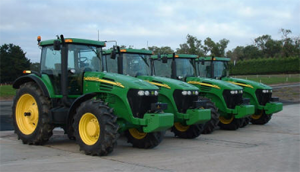Read the latest information on
Foot-and-mouth disease
 Glenn Favero is extremely proactive in his approach to biosecurity and he and his team at Favero Gardens near Cranbourne in Victoria undertake a number of biosecurity practices.
Glenn Favero is extremely proactive in his approach to biosecurity and he and his team at Favero Gardens near Cranbourne in Victoria undertake a number of biosecurity practices.
Running an operation in a peri-urban region, Glenn and his staff are aware of these risks and actively work to mitigate them.
The growing operation focuses on a number of biosecurity measures commencing at the farm gate and ending when the crop leaves his property for sale. Glenn grows celery, parsnip, broccoli, lettuce and Brussel sprouts.
While there are advantages to running an operation close to urban areas – fresh, high quality produce can quickly reach markets in city centres, and year-round employment opportunities can attract employees from urban areas – there can be disadvantages as well. One of them is the increased biosecurity threats that must be effectively managed.
Fruit and veggie gardens in backyards in neighbouring urban environments can be the source of pests and diseases for commercial growers. Unmanaged fruit flies in gardens is a good example of this, but there are others.
Then there’s the potential entry of exotic pests and diseases via sea and air ports. If they enter and go unnoticed, they could quickly spread into peri-urban fruit and vegetable growing businesses.
Being prepared for these events is imperative.
Preparedness measures include pest and disease identification skills among staff, biosecurity training, and the monitoring and recording of not only the presence of pests and diseases but also their absence.
On arrival at the farm gate, visitors must directly contact Glenn or his brother David on their mobile phones before being able to enter the property. Visitors must then report to the office.
There is ample signage on the farm gate, which is located at the edge of the property. This indicates to visitors that they must respect and follow the high set of standards implemented by Glenn and his team.
Returning staff must follow similar procedures and park in designated staff parking.
Similarly, staff are trained in biosecurity procedures and Glenn has instilled in them the importance of biosecurity procedures in their day to day activities.
The staff at Favero Gardens focus on ‘farm hygiene’, which involves using clean materials and equipment to prevent the spread of plant material/pests from paddock to paddock, cleaning boots, and wearing clean clothing.
Farm zoning has operated since the establishment of Favero Gardens. The zones are separated from one another by roads and movement between zones only occurs when it is necessary. Trees have been planted to act as wind breaks and to prevent spray drift between paddocks.
Glenn recognises that biosecurity is everyone’s responsibility and he does as much as possible to play his part. Not only does he strive to maintain biosecurity best practice on his farm, but he works to reduce the risk of potential pests leaving his property as well.